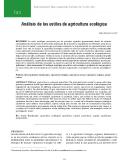| dc.description.abstract | La crisis ecológica provocada por las prácticas agrícolas preconizadas desde las ciencias agroindustriales del modelo de desarrollo dominante ha generado el surgimiento de diferentes propuestas, de muy diversa índole y compromiso, que pretenden solucionar la degradación de los agroecosistemas en el mundo. Para ello, se analiza la agricultura ecológica, desde los diversos enfoques teóricos, confrontándola con la agricultura convencional. Se caracterizan sus variantes, entre las cuales resaltan la agricultura orgánica-biológica, biodinámica, natural y permacultura. el tema emergió desde el estudio de la agricultura ecológica en los círculos académicos exclusivos hasta la creación del movimiento ambiental mundial, llegando el momento de reflexionar sobre los distintos estilos de agricultura ecológica que se han ido conformando hasta la actualidad. La agricultura ecológica aborda necesariamente los aspectos sociopolíticos, por ser producto de su contexto histórico, tomando en cuenta el papel de las transnacionales, organismo mundiales, gobiernos y élites dominantes. El enfoque ecológico es positivo sólo cuando es producto de una perspectiva social crítica del orden existente, con valores morales, espirituales y ecológicos de carácter paradigmático.
The ecological crisis caused by mono-cultivation practices, sponsored by the agro-industrial agricultural sciences of the dominant structure of development, has engendered the emergence of different proposals from diverse sources and levels of commitment, which attempt to resolve the deterioration of agro ecosystems in the world. Ecological agriculture is analyzed by means of different theoretical approaches, confronting it with conventional agriculture. Its variations are characterized, including organic-biological, biodynamic and natural agriculture, and permaculture. The subject emerged from the study of ecological agriculture in academic circles, and arrived at the creation of the worldwide environmental movement. The time has come reflect upon the different styles of ecological agriculture that have been developing until the present time. As a result of its historical context, ecological agriculture must address socio-political aspects, taking into account the rol of transnational companies, worldwide organizations, governments, and the ruling elites. The ecological approach is positive only when it is a product of a critical social perspective of the existing order, with moral, spiritual, and ecological values of paradigmatic nature. | es_ES |


